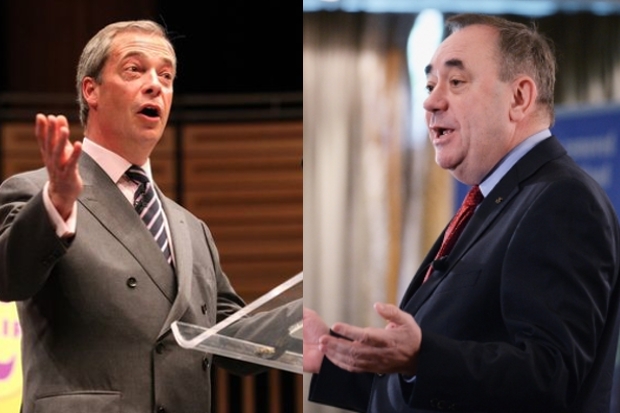You don’t mean a thing if your seat ain’t a swing. As this saying goes, political campaigning in safe seats is usually a thankless task — unless you are Nigel Farage. Last week, he managed to pack out The Sage concert hall in ultra-safe Labour Gateshead for Ukip’s biggest ever-public meeting. By going back to the simple idea of touring the country (even the sceptical parts) and giving speeches, Farage is appealing directly to the voters left behind by the other parties. He told the 1,200-odd assembled crowd of my fellow Geordies:
‘We are here to say that Labour used to stand up for the people in this region, but they have turned their backs on you in favour of the European project. Well, UKIP will stand up for you now.’
BuzzFeed also went along and asked 18 people why they support Ukip. Aside from a few Farage fans, the political class has left them all disgruntled. Yet Labour has not quite grasped why Ukip’s back-to-basics approach and policies are appealing to voters. In response to the Ukip gathering, Gateshead MP Ian Mearns spoke of trade unions, not dealing with concerns over immigration:
‘Apart from opposition to the EU UKIP are clearly and simply a party wedded to opposition to workers’ rights and protective legislation. They have nothing to offer working-class voters but a deterioration of their rights at work and a return to individuals being expendable.’
Compare Ukip’s approach to the ever-improving prospects of the SNP and it’s clear that the two parties are now deploying the same tactics. Xenophobic, making coded jibes against our near-neighbours? Check. Small-minded, and seeking to build a greater wall around your country? Check. Some members with crackpot views? Check. Denouncing the ‘Westminster elite’? Check.
And campaigning using old school political hustings? Check. As the leader in this week’s magazine says, it is the old idea of giving speeches in town halls that are behind SNP’s recent success:
‘In Scotland, the debate is taking forms that Westminster politicians do not understand. Those who truly believe that Scotland should be a separate country tend to be evangelical about it. Their strength is in old-style campaigning: meetings held in towns and village halls. The Better Together campaign does not have this zeal — and this is, in a way, understandable. It is harder to evangelise for the preservation of the status quo.’
The mainstream parties are taking a more sophisticated approach. The Tories have hired Obama’s digital guru and are ardently gathering data. Labour recently signed up Obama’s chief strategist while the Lib Dems are using sophisticated voter targeting software. Instead of focusing on winning the mass vote, parties are now primarily concerned, thanks to technological advances, with persuading a core group of swing voters. As Fraser pointed out last year, David Cameron could have won a majority if just 0.02 per cent of the electorate had voted differently. The Westminster parties think they have a better chance of winning this way.
Whether the SNP enjoy being political brothers with Ukip — and they don’t, judging by Angus Robertson’s recent clash with Fraser — both parties are on the cusp of success by challenging the political establishment in the same way. UKIP and the SNP are using the same plague-on-all-your-SW1-houses gambit, both trying to ride a populist wave sweeping Europe.
Neither may reach their ultimate goal of separation from their respective unions (UK and EU) but they have both made politics more interesting and relevant to people previously disinterested. Regardless of whether you agree with them or not, it’s undoubtedly an achievement.






Comments